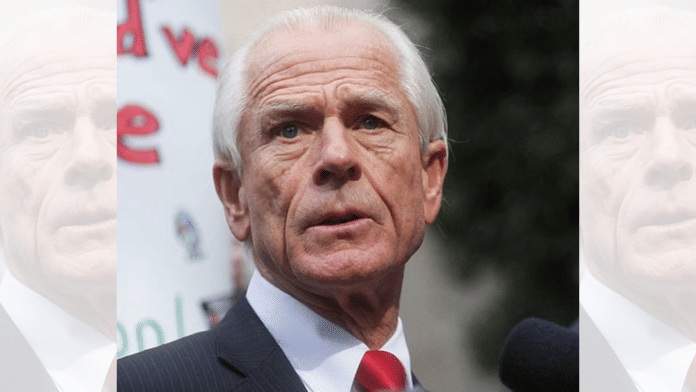New Delhi: US President Donald Trump’s trade counsellor Peter Navarro Thursday launched another broadside against India, calling New Delhi a “laundromat” for Russian oil and claiming it imposes “Maharaja tariffs”, hours after External Affairs Minister S. Jaishankar said he is “perplexed” by the comments emanating from the U.S.
“What is the net impact on the Americans because of our trade with India? Well, let’s think about it. They have higher tariffs. There are Maharaja tariffs, higher non-tariff barriers. We run a massive trade deficit with them. So that hurts American workers, hurts American businesses,” Navarro said in an interaction with the press.
The counsellor to the president added, “India doesn’t appear to want to recognise its role in the bloodshed. It simply doesn’t. It’s cozying up to Xi Jinping is what it’s doing. It’s not acting. And by the way, I wrote that article in the FT just to deal with the propaganda of the Indian government to make people want to feel sorry for them. Oh, they need the oil. They don’t need the oil. It’s a refining profiteering scheme. It’s a laundromat for the Kremlin.”
Earlier in the week, Navarro had written an article in The Financial Times, accusing India’s “oil lobby” of funding Russia’s war machine in its war with Ukraine. US President Trump has also criticised India’s continued purchase of Russian oil, while other administration officials have all come out strongly in recent weeks against New Delhi’s economic engagement with Moscow.
External Affairs Minister Jaishankar Thursday hit back at the US charges, highlighting that New Delhi is not the “largest purchaser” of Russian oil or even LNG from Moscow, pointing out that China and the European Union (EU) have larger trade links.
“We are not the country which has the biggest trade surge with Russia after 2022. I think there are some countries to the south. We are a country where Americans have said for the last few years that we should do everything to stabilize the world’s energy markets, including buying oil from Russia. Incidentally, we also buy oil from America. And that amount has been increasing. So quite honestly, we are very perplexed at the logic of the argument that you had referred to,” said Jaishankar, while speaking at a joint press briefing with his Russian counterpart Sergey Lavrov.
The US on 6 August imposed an additional tariff of 25 per cent on India as a “penalty” for Russian oil purchases, which are set to kick in at the end of the month. When quizzed whether it will be implemented, Navarro said that he sees the tariffs “taking place”.
Navarro laid out his charge of war profiteering, pointing out that India purchases crude from Russia “at a discount” which is then “refined” and sold at “premium prices” into Europe, Africa and Asia.
The counsellor to the President further added that the money earned by Russia for the sale of crude is used to “build more arms and kill Ukrainians,” requiring American taxpayers to provide “more aid, military style to the Ukrainians.”
After Russia’s current phase of conflict with Ukraine began in 2022, the G7 member-states imposed a price cap on Russian oil, ensuring that it would sell at less than $60 a barrel, thereby hurting Moscow’s revenues.
However, the price cap was designed keeping India in mind, former American envoy to New Delhi Eric Garcetti acknowledged last year. The cap was to prevent a shock to global energy markets and keep the prices stable.
India’s purchase of crude from Russia touched $56 billion in the last financial year. Moscow’s trade with India has grown in leaps and bounds since 2022, with overall two-way trade touching roughly $68 billion in 2024-2025.
Also Read: Why the thriving Indian diaspora in the US is not an asset anymore
India doubles down
Jaishankar was in Moscow for a three-day visit from 19 August till 21 August during which steps were taken to deepen economic engagement between both countries.
The terms of reference for a free trade agreement between India and the Russian-led Eurasian Economic Union (EAEU) was agreed to, with negotiations to begin shortly. The EAEU is a single market that consists of Armenia, Belarus, Kazakhstan, Kyrgyzstan and Russia.
Further, Jaishankar and his counterpart Lavrov discussed a number of issues for trade including tariff and non-tariff barriers and the need to reduce them. The current trade deficit between India and Russia is $59 billion in favour of Moscow. India’s merchandise exports to Russia in the last financial year stood at roughly $4.88 billion.
Jaishankar and Lavrov also started preparations for a visit by Russian President Vladimir Putin to India later this year for the annual bilateral visit. Putin has spoken with Prime Minister Narendra Modi twice in the last week.
Modi’s last conversation with Trump was in June, when they spoke over the phone while the Prime Minister was in Canada for the G7 summit. The India-EAEU movement on the FTA comes as New Delhi’s negotiations with Washington D.C. over a bilateral trade deal continues to flounder.
(Edited by Ajeet Tiwari)






